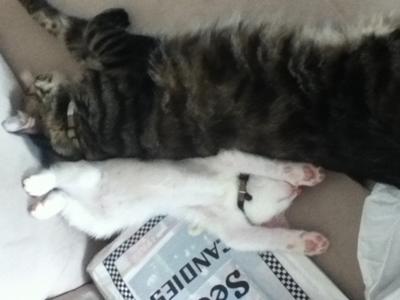My kitten is pooping and peeing right next to the litter box
by Analisa
(San Diego, CA)
I am fairly meticulous about keeping the litter box clean for my three cats, Sam, Bells and Diego. However this morning I came out of my room to notice that Diego had pooped right out side the litter box and this evening I saw him pee right outside the box.
I don't get it. He is 11 weeks and I have had him for about a month. He and the other cats get along fine they groom him and he plays with them but this is strange since he wasn't doing this before. I was very upset which I now know he doesn't really understand so now I have no idea how to get him to stop.
If stress is the problem I have no idea what it could possibly be. I created another litter box because I thought maybe that was the problem. I don't want to stress him but now I'm stressed because how am I going to get the smell of cat pee out of my carpet without bleaching it?
He is very sweet but this behavior is not okay. I don't want Sam and Bells to start doing it too.
My Thoughts:
I'm sorry to hear that Diego is having problems, Analisa, so let's see if we can give you some ideas. That's a very cute picture!
My first thought is that he might not be feeling good and he needs a vet consultation. I don't know his history, but kittens may often have parasites or infections, even if they come from reputable shelters and, unfortunately, sometimes from breeders.
I'm assuming that he's been to the vet recently, but maybe something was missed. Normally, a kitten would be returning to the vet for various vaccinations as some of them are usually given every few weeks around this time.
If he came from a shelter, he would usually be on worming meds too, and these have to be repeated in order to be effective. If he's got worms, your other cats may get them too.
I'm not sure how you did your introductions, but typically you want an isolation period and a slow introduction of the kitten to the resident cats. When cats are introduced too quickly, behavioral problems may develop in any of the cats, sometimes months later.
During the isolation period, the new cat can get used to the new environment, and you can make sure that litter box habits are 100 percent solid. If at any time there are problems, you can revert to isolation. So, you might want to try using isolation/confinement retraining on Diego to see if he gets back on track.
Remember that it can take a cat six months or more to get fully used to a new home, and this can be complicated by the presence of other cats or pets. Kittens tend to adapt more quickly than adult cats, but not always.
Kittens have a different problem. Being young, he's the low man on the totem
Another concern is litter box guarding and/or sharing. Cats tend to time share their territory, and even cats that get along can develop box contention behaviors.
I've had three cats in the house at the same time myself. While they clearly got along great, there have been times when they would fight at the litter box.
"Litter box ambushes" are common in multi-cat households, and it doesn't have to be a physical attack. A stare down might be enough to make the weaker cat, in this case a kitten, too shy to use the box the next time.
It's important that the boxes be placed in an area with multiple escape routes and set up so that it's difficult for another cat (or human) to sneak up on the one using the box.
For an eleven week old kitten, I would normally have a kitten-sized litter box just for him. I would also follow the "one plus one rule." That means that you should have four litter boxes for three cats. While it's possible that you can get away with fewer than that, it's better to start out with too many than too few.
I would thoroughly clean out the litter boxes and scrub them squeaky clean, and replace all the litter with the exact brand and type of litter that was working before.
After you clean up the soiled area, you might try placing a second litter box right on the spot that he used.
Is the litter box hooded? He may have decided he doesn't like the box covered. Try offering an uncovered box right next to the covered one.
Some cats like one litter box to pee in and one to poop in. Other cats don't like to use a box that has recently been used, even if they were the one to last use it. These preferences can develop at any time and can change.
Never get mad at him or show any anger or frustration over his not using the box. Just clean it up quietly. Always praise him when he does use the box.
You don't have to bleach your carpet to get the smell out. There are a number of pet safe/carpet safe cleaners that will work on most pet odors.
You might try Feliway to help reduce stress and Cat Attract litter to encourage use of the litter box. Neither one of these products is guaranteed to work, but they may help.
Make sure that each cat has their own "space" where they can be safe by themselves, and make sure that you make good use of vertical space in the house.
Being able to climb is important to most cats, and scratching posts are essential too for relieving stress.
I hope that helps to give you some ideas. Please keep us informed of his progress.
-Kurt
Comments for My kitten is pooping and peeing right next to the litter box
|
||
|
||
|
||
|
||



